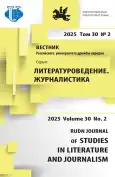Gorky Motives in Prose about Tramps Ai Wu
- Autores: Meskin V.A.1, Yiqing C.1
-
Afiliações:
- RUDN University
- Edição: Volume 30, Nº 2 (2025)
- Páginas: 262-270
- Seção: LITERARY CRITICISM
- URL: https://journal-vniispk.ru/2312-9220/article/view/319125
- DOI: https://doi.org/10.22363/2312-9220-2025-30-2-262-270
- EDN: https://elibrary.ru/IMLJCD
- ID: 319125
Citar
Resumo
Сompared the originality of the depiction of people at the bottom in the works of Maxim Gorky and the Chinese writer Ai Wu (1904-1992). From the comparison it follows that the famous Chinese prose writer of the twentieth century had reason to consider himself a student of the Russian prose writer. Both authors, Gorky in Russia, Ai Wu in China, acted as artists of marginalized people, homeless, and, what is especially important, not only rejected, but also rejecting. An analysis of a large number of stories by the Russian and Chinese writers reveals many creative similarities in themes, problems, poetics, and reveals the identity of their socio-philosophical views. Gorky and Ai Wu in a similar manner decorate stories about ordinary everyd ay life with appeals to bright pictures of nature, to musical and song principles. According to the teachings of A. Veselovsky on the comparative study of literature, here we can speak with certainty about the genetic and typological connections of the two writers.
Palavras-chave
Sobre autores
Vladimir Meskin
RUDN University
Email: c1123485073@gmail.com
ORCID ID: 0000-0003-2260-8060
Grand PhD in Philology, Professor at the Department of Russian and Foreign Literature, Faculty of Philology
6 Miklukho-Maklaya St, Moscow, 117198, Russian FederationCai Yiqing
RUDN University
Autor responsável pela correspondência
Email: c1123485073@gmail.com
ORCID ID: 0009-0002-3769-4766
Postgraduate Student at the Department of Russian and Foreign Literature, Faculty of Philology
6 Miklukho-Maklaya St, Moscow, 117198, Russian FederationBibliografia
- Ai, Wu (1981). Works of Ai Wu. Sichuan People’s Publishing House. (In Chin.)
- Bushkanets, L.E. (2021). Maxim Gorky and the fashion for the tramp at the beginning of the 20th century. Russian Studies, (3), 51–70. (In Russ.)
- Gorky, M. (1940). About how I learned to write. Moscow: Fiction. (In Russ.)
- Hou, Min. (2014). About humanism in the stories about the tramps of IU and Gorky. Series of studies of modern Chinese literature, (9), 68–75. (In Chin.)
- Jiang, Mingdai. (1998). Ai Wu: A song about the life quest of a wanderer – about the literary value of Ai Wu’s tramp novels. Journal of the Jiangsu Institute of Education, (2), 62–66. (In Chin.)
- Lian, Zhengxiang. (1992). Wandering Literary Hero: Biography of Ai Wu. Beiyue Literature and Art Publishing House. (In Chin.)
- Mao, Wen, & Huang, Lizhu. (1986). Ai Wu. Research Collection. Sichuan Literature and Art Publishing House. (In Chin.)
- Mikhailovsky, Skabichevsky, Menshikov, Minsky, Posse, Obolensky, Botsyanovsky, Ignatov, Gekker, A.B., & S.M. (1901). Critical articles about the works of Maxim Gorky. Saint Petersburg: S. Grinberg. (In Russ.)
- Shirvanova E.N., & Mirzaeva Sh.A. (2018). The problem of man and environment in the stories of M. Gorky 1890–1905. MNKO, (3), 540–541. (In Russ.)
- Zhang, Jianfeng. (2011). Comparison by reflection of the national characters of Ai Wu and Gorky. Journal of Chengdu University, (1), 82–87. (In Chin.)
Arquivos suplementares









